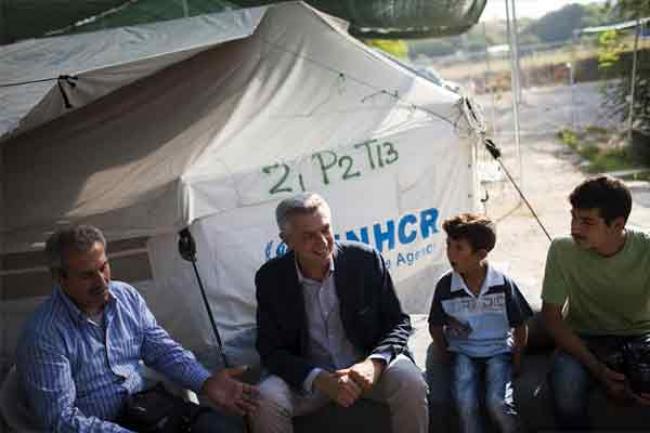Just Earth News 26 Aug 2016, 07:13 pm Print

UNHCR/Achilleas Zavallis
“The challenges are very serious, and we need to continue to address them together,” UN High Commissioner for Refugees Filippo Grandi said in a news release, citing living conditions, security in refugee sites, and overcrowding on islands.
Greece’s shores were the gateway to other EU countries for more than 856,000 refugees and migrants last year, according to the High Commissioner’s Office (UNHCR). Flows have slowed significantly this year, but some 50,000 people remain in the country, with a small number still arriving daily.
Although conditions in reception centres are slowly improving, many people still live in overcrowded and inadequate sites as they await solutions for their future.
The visit, his second since becoming UNHCR chief at the start of the year, came a month ahead of the UN Summit on Refugees and Migrants to be held in New York on 19 September 2016.
In Greece, he stressed the need for EU member states to speed up legal options such as family reunification and relocation through the bloc’s official relocation programme, the news release said.
So far 3,054 refugees have been relocated from Greece to other EU member States, while another 3,606 are scheduled to depart in the coming months. Still, support lags as member states have pledged only 8,003 spaces out of 66,400 committed.
“I will continue to advocate for these programmes to be bigger and accelerated,” Grandi said. “It can and must work.”
Unaccompanied children ‘a high-priority concern’
On Wednesday, Grandi met with Greek Prime Minister Alexis Tsipras and President Prokopis Pavlopoulos, and then visited a shelter for unaccompanied children run by Praksis, a Greek NGO supported by UNHCR.
Unaccompanied children in Greece are a high-priority concern for UNHCR. Some 1,472 are on a waiting list for a safe shelter. UNHCR has so far provided 345 temporary shelter spaces for children alone. Another 245 spaces are planned.
High Commissioner Grandi called the Praksis centre a model for care of unaccompanied children. It is home to 21 boys aged seven to 17 from Syria, Afghanistan, Pakistan and elsewhere. They receive round-the-clock care, and some attend a neighbourhood school. All arrived in Europe without their parents or relatives, and several spent time locked in detention centres in Greece or living in the streets before coming to the shelter.
“It felt terrible. It is very difficult not knowing if my family was alive,” Waris, a 14-year-old boy from Baghlan, Afghanistan, said of his journey. He fled to Europe four months ago. Though the boy set out with his family – his father, mother, and three younger brothers – they were separated at the Iran-Turkey border when shots were fired. Waris continued onward through Turkey and to Greece alone, at the urging of a human-smuggler.
Since he arrived, Waris has not been able to reach his parents or siblings, and worries that they may have died. “But in the past few days my lawyer found my uncle in the United Kingdom, and we will do family reunion. So now I can look forward,” he said.
Grandi also visited a three-generation Syrian family who fled Aleppo in February, after their home and bakery business were bombed. One family member was killed and another kidnapped.
Half the family will be relocated to France, while the others await reunion with their father in Germany. “We lost everything in our home country, so we are looking forward to being somewhere safe,” said 58-year-old Mohamed Wafa Barri, the family patriarch.
- Pakistan: Police recover two bullet-ridden bodies from Balochistan
- IDF strikes Hezbollah targets in Lebanon after projectile fire toward Northern Israel; 31 killed
- Pakistan: Armed gunmen kidnap 14 workers during coordinated raids in Balochistan
- ISIS-inspired plot foiled in UK: Two men get life sentences for targeting Jewish community
- India rejects allegations, urges Pakistan to tackle its ‘home-grown ills’





-1763561110.jpg)
